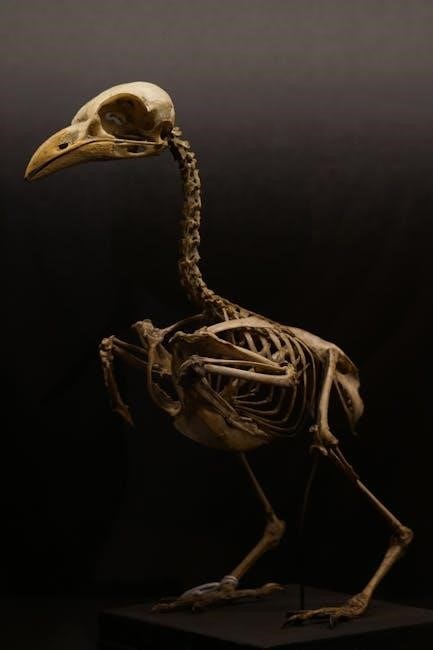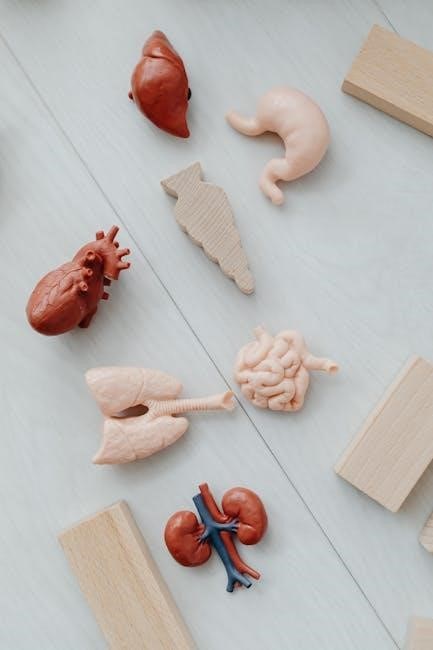
teas science study guide pdf free
The TEAS Science Study Guide is a comprehensive resource designed to help students master scientific concepts and prepare effectively for the TEAS exam. It offers detailed explanations, practice questions, and real-world examples to enhance learning. This guide is structured to cover all essential topics, ensuring a thorough understanding of biology, chemistry, and physics. With its clear and organized approach, it serves as an invaluable tool for achieving success in the TEAS Science section. Downloading a free PDF version provides convenient access to study materials anytime, anywhere, making it an excellent choice for self-paced learning and exam preparation.
Importance of TEAS Science Study Guide
The TEAS Science Study Guide is essential for students seeking to excel in the TEAS exam, as it provides focused preparation and in-depth understanding of scientific concepts. By aligning with the exam’s content, it helps identify knowledge gaps and strengthens weak areas. The guide’s structured approach ensures comprehensive coverage of biology, chemistry, and physics, while its practice questions enhance test-taking strategies. Accessing a free PDF version offers convenience, enabling students to study efficiently and achieve their academic goals without financial barriers. This resource is a cornerstone for effective and strategic learning.
Key Features of TEAS Science Study Guide
The TEAS Science Study Guide offers comprehensive coverage of essential topics, including biology, chemistry, and physics, with detailed explanations and examples. It includes practice questions and quizzes to assess understanding and improve test-taking skills. The guide is designed to align with the TEAS exam format, ensuring targeted preparation. Available as a free PDF, it provides flexible and accessible learning. Additional features include diagrams, charts, and study tips to enhance retention and understanding, making it a valuable resource for exam success.
Overview of TEAS Science Exam
The TEAS Science Exam assesses knowledge in biology, chemistry, and physics, testing both factual recall and application skills. It is essential for healthcare career preparation, ensuring students demonstrate a strong scientific foundation. The exam format and content are designed to evaluate critical thinking and problem-solving abilities, making it a crucial step in academic and professional advancement. Utilizing a free PDF study guide provides accessible resources to excel in this challenging assessment;
Structure of the TEAS Science Exam

The TEAS Science Exam is divided into three main sections: biology, chemistry, and physics. Each section contains multiple-choice questions designed to test both factual knowledge and the ability to apply scientific concepts. The biology section covers topics such as human anatomy, genetics, and ecology. Chemistry focuses on basic principles, chemical reactions, and laboratory procedures. Physics includes mechanics, energy, and scientific reasoning. The exam is timed, with a total of 100 questions to be completed within 60 minutes. Effective time management and a strong understanding of each subject area are essential for success. Utilizing a free TEAS Science Study Guide PDF can help familiarize test-takers with the exam format and content, ensuring they are well-prepared for the assessment.
Key Concepts Covered in TEAS Science
The TEAS Science exam emphasizes core scientific principles across biology, chemistry, and physics. Biology topics include human anatomy, cellular structure, genetics, and ecology. Chemistry focuses on atomic structure, chemical bonding, and reactions. Physics covers mechanics, energy, and motion. Additionally, the exam tests scientific reasoning and data interpretation skills. A free TEAS Science Study Guide PDF provides detailed explanations and practice questions, ensuring comprehensive coverage of these concepts. Regular review of these materials helps build a strong foundation for exam success.
Science Categories and Subcategories
The TEAS Science exam is divided into three main categories: biology, chemistry, and physics. Biology includes topics like human anatomy, cellular biology, and ecology. Chemistry covers foundational concepts such as atomic structure, chemical bonding, and reactions. Physics focuses on mechanics, energy, and motion. Each category is further broken down into subcategories, ensuring a detailed understanding of scientific principles. A free TEAS Science Study Guide PDF provides a structured breakdown of these categories and subcategories, helping students focus their study efforts effectively.

How to Use the TEAS Science Study Guide Effectively
Download the free TEAS Science Study Guide PDF and set a structured study schedule. Use active learning techniques like highlighting and note-taking. Regular review ensures retention and exam readiness.
Strategies for Quick Learning
Use the TEAS Science Study Guide PDF to focus on high-yield topics and practice questions. Break study sessions into manageable chunks, emphasizing active learning techniques like summarization and self-quizzing. Prioritize weak areas identified through diagnostic tests. Utilize flashcards for quick concept reviews and maintain a study schedule to ensure consistent progress. Regularly review and apply scientific reasoning skills to build exam confidence effectively. Stay organized and focused to maximize learning efficiency.
Common Mistakes to Avoid
Avoid cramming and ensure consistent study sessions. Neglecting to review incorrect answers can hinder progress. Don’t skip timed practice, as it mirrors exam conditions. Overreliance on memorization without understanding concepts is a pitfall. Avoid ignoring scientific reasoning and lab-based questions, as they are critical. Don’t underestimate the importance of understanding basic principles before moving to complex topics. Stay focused and methodical to avoid these common mistakes and improve your TEAS Science exam performance effectively.

Detailed Breakdown of Science Topics

The TEAS Science Study Guide covers biology, chemistry, and physics in depth. It includes detailed explanations of human body systems, chemical reactions, and physical principles, ensuring comprehensive understanding.
Biology and Human Body Systems
This section of the TEAS Science Study Guide focuses on understanding the structure and function of the human body. It covers essential biological concepts, including cells, tissues, organs, and systems. Topics such as the skeletal, muscular, nervous, circulatory, respiratory, and digestive systems are explored in detail. Additionally, the guide provides insights into how these systems interact to maintain homeostasis and overall health. Practical examples and diagrams help learners grasp complex processes, making this section a cornerstone of effective TEAS preparation.
Chemistry Fundamentals
The TEAS Science Study Guide covers essential chemistry concepts, starting with the periodic table and atomic structure. It explains chemical bonding, including ionic, covalent, and hydrogen bonds. Students learn about chemical reactions, stoichiometry, and lab safety protocols. The guide also addresses pH levels, acids, bases, and solutions, providing clear examples and practice problems. These fundamentals are crucial for understanding biological processes and preparing for the TEAS exam. The free PDF version ensures easy access to these critical chemistry topics anytime.
Physics and Scientific Reasoning
The TEAS Science Study Guide delves into physics fundamentals, covering motion, forces, energy, and thermodynamics. It emphasizes scientific reasoning skills, such as analyzing data and drawing conclusions. Topics include Newton’s laws, work, and power, as well as wave mechanics and electricity. The guide also explores scientific inquiry methods and lab techniques, fostering critical thinking. By mastering these concepts, students can confidently tackle physics-related questions on the TEAS exam. The free PDF version ensures these resources are accessible for tailored study sessions.
Anatomy and Physiology
The TEAS Science Study Guide thoroughly covers anatomy and physiology, focusing on the structure and function of human body systems. Key topics include the skeletal, muscular, and nervous systems, as well as the digestive, circulatory, and respiratory processes. The guide explains how these systems interact to maintain homeostasis and overall health; Detailed diagrams and real-world examples help students grasp complex concepts. By mastering this section, learners can confidently address anatomy and physiology questions on the TEAS exam, ensuring a strong foundation for healthcare-related studies.

Practice Questions and Quizzes
Practice questions and quizzes in the TEAS Science Study Guide reinforce learning and improve test-taking skills. They cover key topics, helping students identify strengths and areas for review. Regular practice builds confidence and ensures mastery of scientific concepts, making exam preparation more effective and streamlined. These resources are essential for achieving success on the TEAS Science exam.
Importance of Practice Tests
Practice tests are crucial for assessing readiness and identifying areas needing improvement. They simulate real exam conditions, helping students manage time effectively and reduce anxiety. Regular practice fosters familiarity with question formats and content, ensuring a confident approach. By reviewing mistakes, learners refine their understanding and develop strategies to tackle challenging topics. Utilizing free PDF resources, such as the TEAS Science Study Guide, provides accessible tools for consistent practice, ultimately enhancing performance and achieving success on the exam.
How to Approach TEAS Science Questions
Approaching TEAS science questions requires a strategic mindset. Start by carefully reading each question and identifying key terms. Eliminate obviously incorrect answers to increase chances of selecting the right one. Focus on understanding the scientific concept being tested rather than memorizing facts. Use process-of-elimination for complex questions and manage time effectively by skipping difficult ones initially. Practice with sample questions from the TEAS Science Study Guide to build familiarity and confidence in tackling various question types.
Stress Management and Study Tips
Effective stress management and study techniques are crucial for success. Prioritize a balanced schedule, practice mindfulness, and maintain a healthy lifestyle. Organize study sessions, set realistic goals, and review material regularly to stay focused and confident. Incorporate short breaks to recharge and avoid burnout. A well-structured study plan coupled with relaxation practices ensures optimal preparation and mental well-being.
Effective Stress Management Techniques
Managing stress while studying for the TEAS Science exam is essential for maintaining focus and productivity. Techniques like mindfulness, deep breathing, and regular physical activity can help reduce anxiety. Incorporate short breaks into your study routine to avoid burnout. Prioritize a balanced schedule, ensuring time for relaxation and leisure. A well-organized study plan, coupled with stress-reducing practices, fosters a calm and focused mindset, enabling you to approach challenging topics with clarity and confidence. Consistency and self-care are key to long-term success.
Study Motivation and Productivity
Maintaining motivation and productivity is crucial for effective TEAS Science preparation. Set clear, achievable goals and celebrate progress to stay driven. Create a structured study schedule and stick to it, ensuring consistent review of key topics. Use active learning techniques, such as summarizing concepts or teaching others, to enhance retention. Leveraging the TEAS Science Study Guide PDF provides accessible, organized material to streamline your learning process. Stay positive, track your milestones, and remind yourself of your long-term goals to maintain focus and determination throughout your preparation journey.
Mastering the TEAS Science exam requires consistent effort and strategic use of resources. Regularly review notes, practice with sample questions, and stay focused. Utilize the TEAS Science Study Guide PDF for targeted learning and retain key concepts. Stay positive, track progress, and maintain a growth mindset to achieve success. Good luck on your exam!
Summarizing Key Points
The TEAS Science Study Guide PDF is a valuable resource for exam preparation, offering comprehensive coverage of key scientific concepts. It includes detailed explanations of biology, chemistry, and physics topics, along with practice questions to reinforce learning. The guide is structured to align with the TEAS exam format, ensuring familiarity with question types and content. Regular review of the material, combined with consistent practice, will enhance understanding and confidence. Utilize this guide effectively to master the TEAS Science section and achieve success on your exam.
Final Encouragement and Next Steps
Stay focused and consistent in your preparation using the TEAS Science Study Guide PDF. Begin with practice questions to assess your strengths and weaknesses. Dedicate time to reviewing challenging topics like biology and chemistry. Utilize the guide’s structured format to familiarize yourself with the exam’s content and timing. Stay motivated by setting achievable goals and celebrating progress. With persistence and effective study habits, you’ll be well-prepared to achieve success. Download the guide today and take the next step toward acing the TEAS Science exam!
Related Posts

national audubon field guide to mushrooms
Unlock the fascinating world of mushrooms! Audubon’s guide makes identification easy & fun. Explore detailed descriptions & stunning photos. Your **mushroom** journey starts here!

being a dik season 2 guide
Dive into the world of “Being a Dik” with our comprehensive Season 2 guide. Get episode breakdowns, key highlights, and insider tips. Your ultimate resource for the latest season!

tv guide delray beach
Discover what’s on TV tonight in Delray Beach. Your complete guide to local channels, shows, and listings. Find your favorite channels now!